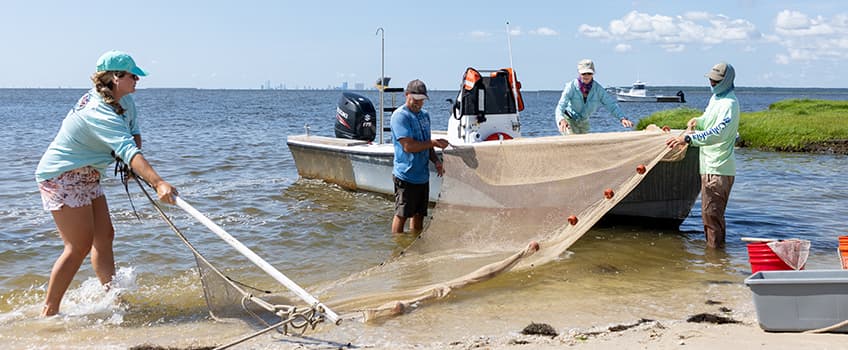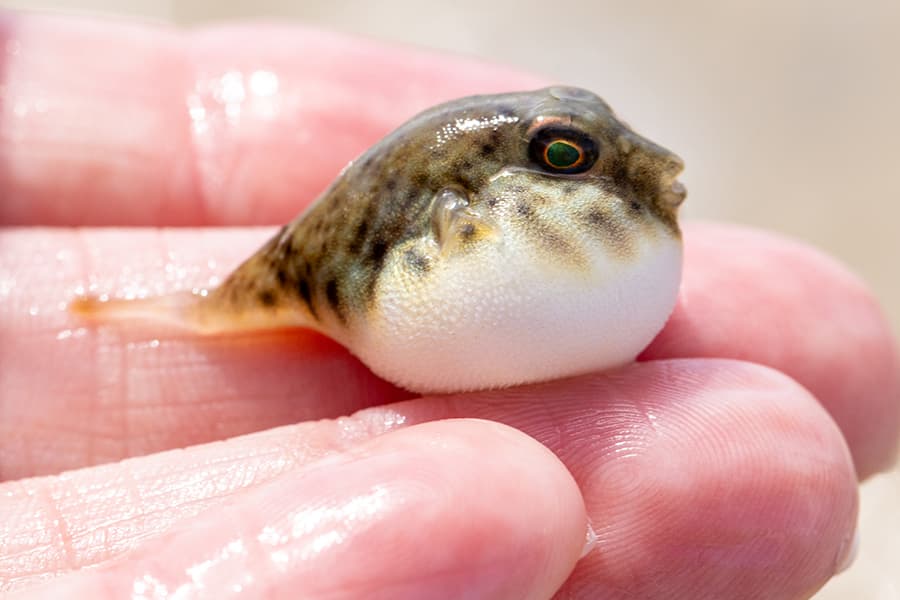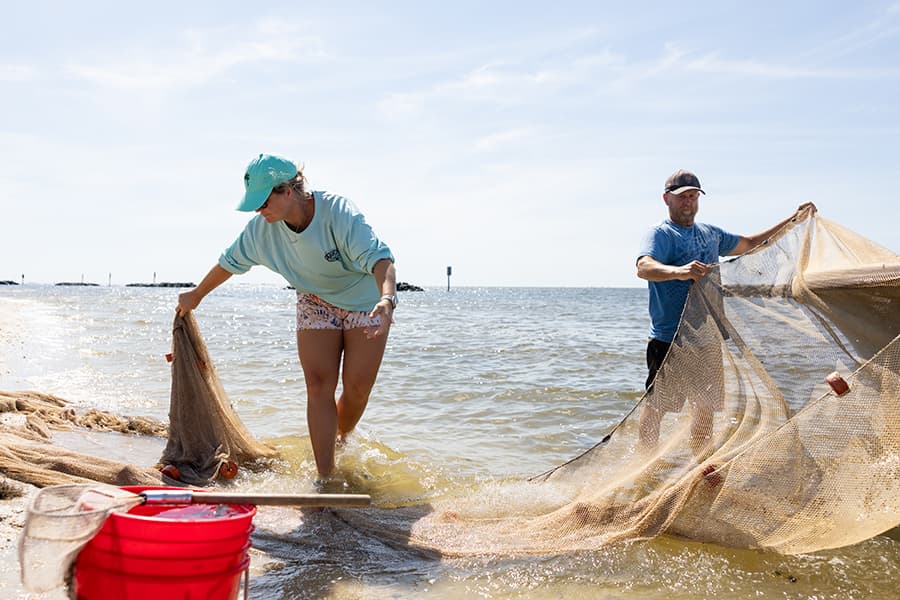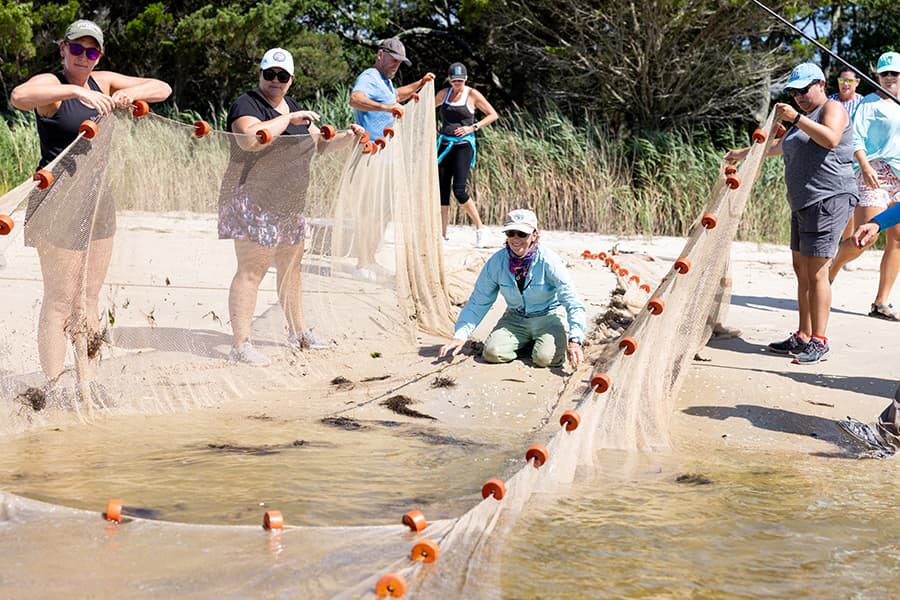K-12 Teachers Get ‘Hands-on, Feet-wet’ Instruction on Climate Change

Melissa Yurowski, left, a teacher at Pinelands Regional High School, and Jon Wudzki, center, a teacher in the Lakewood School District, help pull a seine net on the beach at Graveling Point Beach in Little Egg Harbor Township as part of a free climate change workshop by Stockton's Climate Change Learning Collaborative. The collaborative was established through Stockton's Southern Regional Institute and Educational Technology Training Center and funded by a $600,000 grant from the state Department of Education.
Little Egg Harbor Township, N.J. — As Stockton University Marine Science Professor Mark Sullivan pried open the mouth of a juvenile needle fish to reveal its pointed teeth, a couple of the teachers gathered on the Graveling Point Beach yelped in surprise.
“Oh, I did not expect that!”
That was just the reaction Sullivan and Stockton Education Professor Kim Lebak had hoped would come from this group of kindergarten to 12th-grade teachers participating in a “hands-on, feet-wet” workshop as part of the university’s Climate Change Learning Collaborative (CCLC).
For the second straight year, the collaborative, established through Stockton’s Southern Regional Institute and Educational Technology Training Center, has held a series of free workshops to help teachers incorporate New Jersey’s climate change learning standards into their lesson plans.

A juvenile northern pufferfish is just one of the many species caught in the seine net that the teachers were able to get a hands-on, feet-wet look at during the workshop.
In 2020, New Jersey became the first state to integrate climate change curriculum across multiple teaching areas, including science, social studies, world languages and the arts. Stockton received a $600,000 grant from the New Jersey Department of Education earlier this year to fund the workshops.
“If you are a science teacher, you’re probably going to have a pretty good handle on what’s behind climate change,” said Lebak, who’s the co-director of the CCLC. “But when we start talking about kindergarten or art teachers, they may never have had a science class past high school.”
Lebak said Stockton is uniquely positioned to lead these climate change workshops because of its Marine Field Station on the Nacote Creek in Port Republic, its Galloway campus on 1,600 acres in the Pinelands National Reserve and its Atlantic City campus right on the beach.
“We’re positioned to be able to make these authentic connections for our teachers because we’re already doing so much of the work,” she said. “There are so many parts of what we do at Stockton that are directly related to the challenges we’re seeing regarding climate change.”
The workshops are a combination of classroom instruction and experiential learning opportunities through community-based partners and the university’s field station. On last week’s field trip, Sullivan and Lebak had just finished deploying a 100-foot-wide seine net off the beach in hopes of collecting as many different types of aquatic species as possible.
The net’s first pull teemed with life, including soft shell crabs, kingfish, sea robins, spot, striped burrfish that puff up when excited, and even permit, which is usually found in more tropical climates.
“You can’t control what you get. It’s the luck of the draw,” Sullivan said. “We’ve had days where we pull only one or two species. We were lucky to get so many this time.”

Melissa Yurowski, left, a teacher at Pinelands Regional High School, and Jon Wudzki, a teacher in the Lakewood School District, help pull the seine net on the beach. Both teachers are Stockton University graduates.
Jon Wudzki waded into the water off the beach to help pull the net to shore. The 1994 Stockton graduate grew up around the water in Island Heights and Seaside Park in Ocean County but was still “shocked at all of the different wildlife.”
“I haven’t really done much seining, but it’s wild what we were able to pull up,” said the sixth-grade math teacher from the Lakewood School District. “It’s great to see something local. Anything that you’re able to talk to students about from a local standpoint makes more of an impact.”
Wudzki co-teaches with special education instructor Jason Storch, who loved the fact that their beach trip could show students that learning about climate change can be fun, especially for his students who live in a more urban environment.
“Science can be fun. Taking a boat ride is fun,” he said. “A lot of kids don’t get to see the environment, and I don’t want extreme weather events and disasters be their only knowledge of climate change. I’d like them to see plants in nature. Get out and hike. Get in the woods or in the water and become connected with nature, so they care about it.”
As the teachers sifted through the net, Sullivan explained how he does this exact same exercise with his Stockton students. He also ran similar experiments years ago when he worked on a state Department of Environmental Protection study aimed at categorizing the different types of juvenile fish found in the Great Bay and Mullica River.
“It gives them a feel for how you would collect that type of data, particularly if you’re doing a long-term monitoring study,” he said. “This snapshot today isn’t going to tell us a lot, but it really becomes powerful when you tie that in with long-term data that you can get from the state or commercial fishing data. Then you can really put together some extensive models to predict how a given population is affected by things like climate change.”

Stockton Marine Field Station Assistant Elizabeth Bick, center kneeling, helps a group of K-12 teachers pull a seine net onto the Graveling Point Beach in Little Egg Harbor Township as part of a workshop offered by the university’s Climate Change Learning Collaborative.
Pulling the seine net off the beach was a familiar experience for Melissa Yurowski. The 30-year-old marine science teacher at Pinelands Regional High School did the same thing with Sullivan when she was a Stockton student.
“What was really cool about this experience is that I was able to see how the biodiversity changed from when I did it 11 years ago compared to today,” said the 2017 Marine Science graduate, who also got her master’s in Education at Stockton this year. “It was great to come back and feel like I was that aspiring marine biologist who wanted to make a difference in the world.”
Did she notice anything different in the types of species caught in the net between then and now?
“Today we caught a lot of tropical fish (like permit). Although they always come up this way due to the Gulf Stream, there were a lot more present, so it shows our waters are warmer and more suitable for them,” she said.
But the biggest takeaway for Yurowski was her ability to talk to other teachers from all different grade levels and share ideas and different ways to instruct students on climate change.
“I can’t engage my students unless they’re interested. So, this workshop is great because it’s taking place in the town that we’re in,” she said. “This is literally what’s happening in their backyard.”
The CCLC offers workshops throughout the year. Teachers can sign up through the website where they can also explore climate change resources and lesson plans.
— Story by Mark Melhorn, photos by Susan Allen


